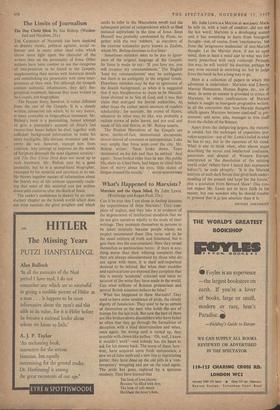The Limits of Journalism
TkIE Carpenter Of Nazareth has been depicted as dreamy mystic, political agitator, social re- former and in many other ideal roles which throw more light upon the character of the writers than on the personality of Jesus. Other authors have been content to use the categories of interpretation to be found in the Gospels, supplementing their stories with historical details and embellishing the personality with some inter- pretation of their own. Yet although the Gospels contain authentic information, they defy bio- graphical treatment, because they were written to be Gospels, not biographies. The Passion Story, however, is rather different from the rest of the Gospels. It is a closely written, connected tale which, by its very nature, is more amenable to biographical treatment. Mr. Bishop's book is a painstaking, honest attempt to give a journalist's account of Jesus's last twenty-four hours before he died, together with sufficient background information to make his story intelligible. His obvious reverence and sin- cerity do not, however, exempt him from criticism. Any attempt to improve on the words of Scripture demands the most rigorous scrutiny: and The Day Christ Died does not stand up to such treatment. Mr. Bishop may be a good journalist, but he is a second-hand biographer, swamped by his material and uncritical in its use. He throws together masses of information about the Jewish way of life without apparently realis- ing that most of this material was not written down until centuries after the death of Jesus.
The reader's confidence is shaken by an intro- ductory chapter on the Jewish world which does not even mention the great prophets and which
omits to refer to the Maccabean revolt and the subsequent period of independence which so fired national aspirations in the time of Jesus. Jesus Himself was probably condemned by Pilate, to- gether with the two 'robbers,' as members of the extreme nationalist party known as Zealots, whom Mr. Bishop dismisses in five lines! Sometimes mistakes seem to be due to ignor- ance of the original language of the Gospels. So Jesus is made to say: `If you love me, you will treasure my commandments.' The English 'keep my commandments' may be ambiguous, but there is no ambiguity in the original Greek. Elsewhere mistakes may be due to ignorance of the Jewish background, as when it is suggested that it was blasphemous to claim to be Messiah. Jesus claimed to be Son of God, and it was that claim that outraged the Jewish authorities. At other times the author seems unaware of modern scholarship.: for example, the crown of thorns, whatever its relics may be like, was probably a radiate crown of palm leaves, and not oval and made of felt and thorns, as Mr. Bishop asserts.
The Passion Narratives of the Gospels are terse, matter-of-fact, unemotional documents, almost devoid of comment or interpretation. Luke says simply that Jesus wept, over the city. Mr.
• Bishop writes : 'Jesus broke down. Tears shimmered on his lids and then he sobbed.' And again : 'Jesus looked older than he was. His public life, short as it had been, had begun to chisel little lines of worry about his eyes, little skeins of fatigue around the mouth.' HUGH MONTEFIGRE


































 Previous page
Previous page